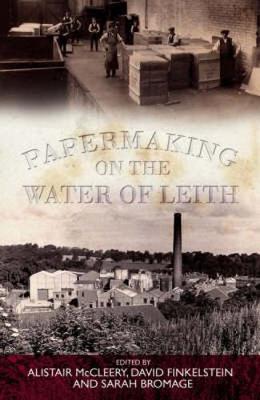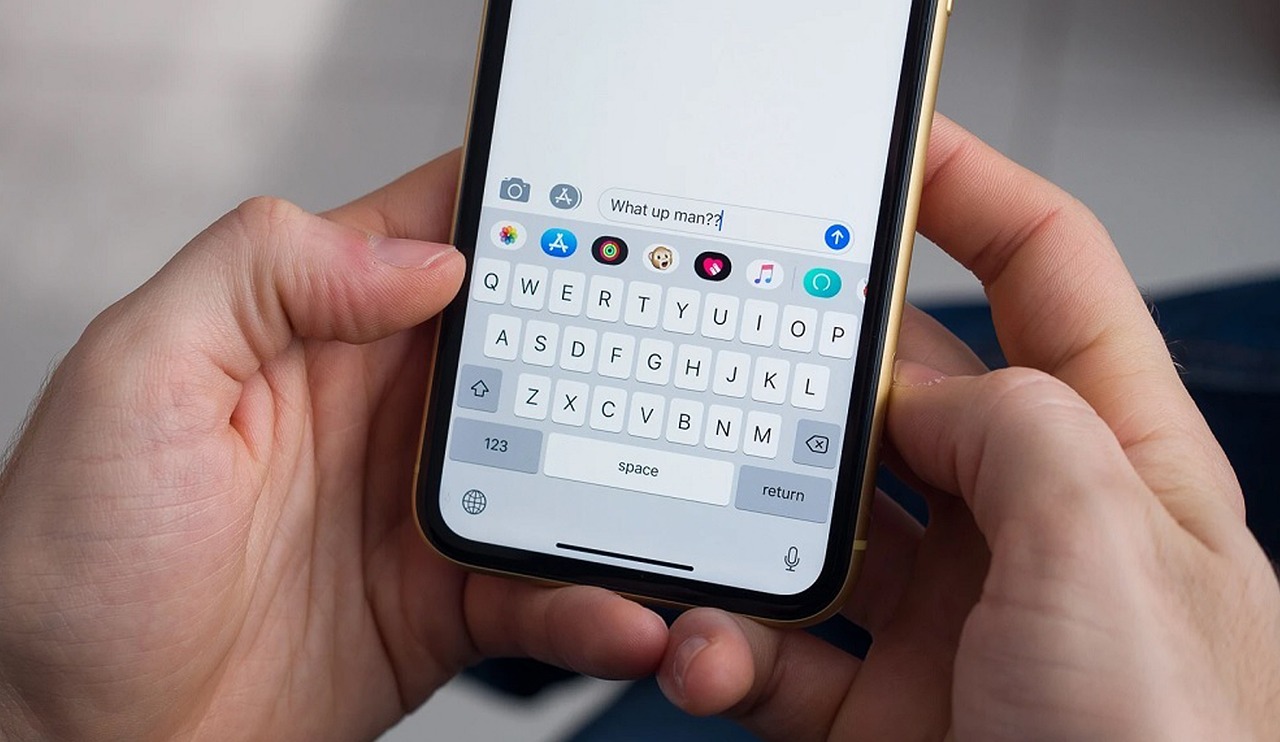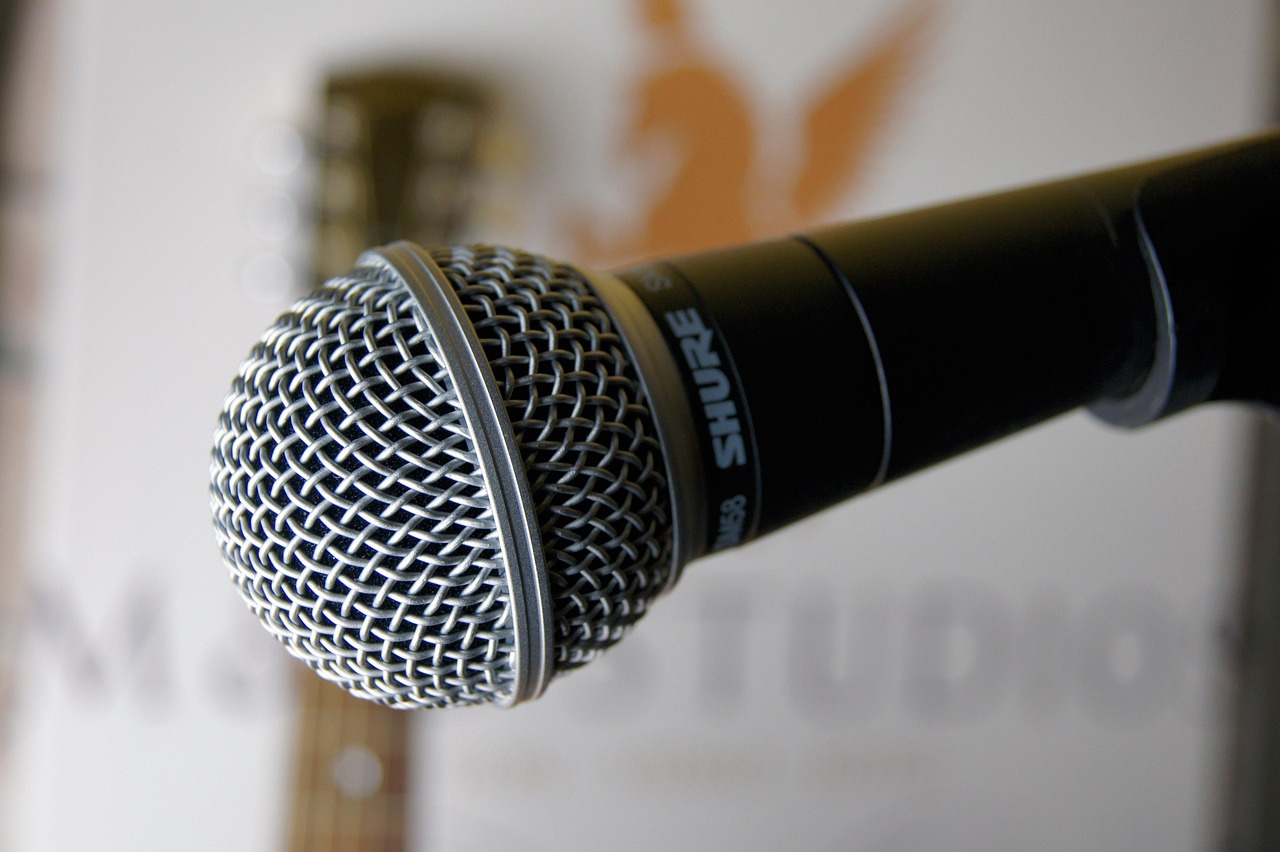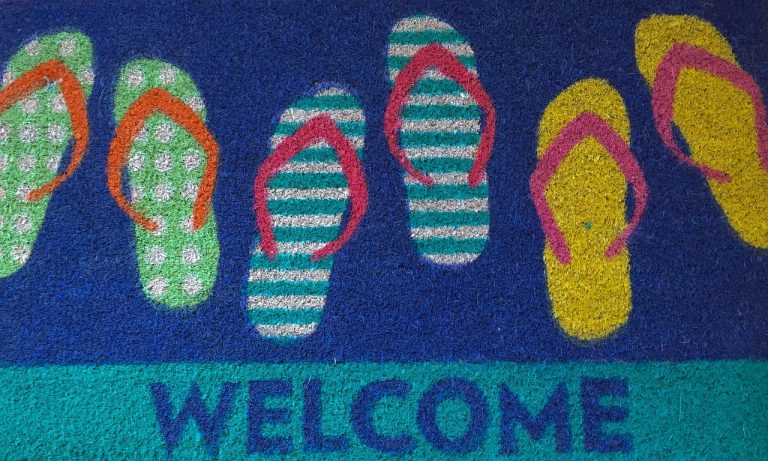The power of idiolect: why voice matters in travel copywriting
Before you read any further, I should warn you that this blog post touches on some of life’s heavier things like illness, grief and loss.
If you’re feeling fragile, better jump ahead to the mini lesson and find out how this applies to your travel and tourism copywriting. But if you’re up for a story, here goes.

The book I thought was boring (until it wasn’t)
My dad taught me a lot of things, far too many to list here. He would’ve been amazed to find out he’d also taught me an important lesson about copywriting, and that’s what I want to share with you here.
A few years ago, I was visiting my folks when my dad proudly handed me a book he featured in. It was called Papermaking on the Water of Leith, and there was a whole chapter about his apprenticeship at an Edinburgh paper mill back in the 1960s.
He was chuffed to bits. Though he did remark, slightly disappointedly, that the interviewer had just written everything down as he said it, without shaping it into more of a narrative.
I glanced at the title, at the sepia-toned cover and thanked dad politely. When I got home, it went on the shelf. Where it stayed for years.
My mum once joked that the book was her go-to read for the nights she struggled to sleep (no one’s allowed airs and graces in my family!), and we all laughed. At the time, with two wee ones and no hot flushes, I didn’t have trouble sleeping anyway.
Why would I read the world’s most boring-looking book when I could ring my dad for a yarn any time I felt like it?
Fast forward a few more years, and I was no longer able to take that for granted.
After ten years with cancer, dad passed away. I don’t think any of these years were much fun for him (though he rarely complained) but in his final months, the cancer attacked his larynx.
He lost his voice and was left with a strained whisper, which was hard to hear. And surely very hard for him to bear, as he loved nothing more than a good blether.

The line that brought him back
For a while after he died, when I tried to hear his voice in my head, that whispery rasp was all I could come up with.
Then one day, I needed to confirm some of the biographical notes on Dad’s funeral programme. In doing so, I pulled down that book. Papermaking on the Water of Leith!
I found the bio I needed in the front section. But something made me flick through the first chapter. And there, suddenly, was a line of his.
One of Dad’s lines.
And just like that, he was back.
Not whispering. But in his full, warm, lovely, unmistakable voice. I could hear him again! I felt like running out onto the streets of Lerwick and reading snippets aloud to random strangers. I honestly felt like I’d summoned him back from the dead.
Papermaking on the Water of Leith is now on my bedside table, top of the pile. I still haven’t developed a deep interest in paper making (life’s short, and I’ve got dystopian fiction to read), but I often pick it up and read a few pages. And every time I do, I hear him. What a gift.

What Is Idiolect?
The mini lesson:
I’m telling you this very personal story because I want to demonstrate the power of voice: specifically, the power of idiolect.
Everyone has an idiolect. It’s your dialect, but on an individual level.
While a dialect is what’s shared by a group of speakers regionally, an idiolect is uniquely yours. It’s your own vocabulary, grammar, funny little expressions, and so on.
I know that I’ve inherited lots of expressions from my mum and dad. Their linguistic legacy lives on in me. I have little things I’ve picked up from my Gen Z kids: phrases that I use when I feel like getting down with the kids. A few Shetland words have crept into my vocabulary. Words from my Edinburgh childhood, lScots words like scaffy, or chummy. It’s the habit of speaking, the expressions I use. This is my idiolect.
And the good news is that you have an idiolect too.
Why most travel business copy sounds the same (and what to do about it)
Look around you. Scroll through your inbox, look at the emails you get. Look at the social media posts. You’ll see, and you’ll be forgiven for thinking that there’s no such thing as an idiolect. Because everybody nowadays seems to speak and write in the same voice. There’s a kind of metallic, robotic tang to it as well.
If you decide to harness the power of your idiolect, you really are going to put yourself head and shoulders above everybody else.
If we take this back to knowing, liking, and trusting: the easiest way you can display your humanity is by writing in your own voice.
Honouring your own unique speech patterns and vocabulary is not something you’ll do if you worry about what others think, if you try to fit in, if you want to sound like everybody else, or if you use AI to generate your posts.
Copywriting examples for travel businesses
Let me show you what I mean with some (anonymised) examples from the travel industry.

Holiday rental welcome message
Before: Welcome to our property. Check-in is at 3 PM. Checkout is at 11 AM. The WiFi password is posted on the fridge. Please respect our neighbours and keep noise to a minimum after 10 PM.
After: Hello! We’re so glad you’re here. Pop the kettle on, put your feet up, and have a proper look around. Check-in’s at 3 (but if you’re early, just give us a ring and we’ll do our best). WiFi password’s on the fridge door. Oh, and the neighbours are lovely, but they do have a wee one who goes down at 10, so if you could keep it down after that, we’d be grateful. Enjoy!
Tour company about us
Before: We are a family-owned tour company offering authentic experiences in the Scottish Highlands. With over 20 years of experience, we provide unparalleled service and unforgettable memories.
After: My dad started doing these tours in 1998 because he was sick of visitors missing the best bits. Now it’s me and my sister running the show, and we’re still obsessed with showing you the Scotland that doesn’t make it onto the postcards. Fair warning: we talk a lot, we know everyone, and yes, we will absolutely take you to our favourite chip shop.
Email to Potential Guests
Before: Thank you for your inquiry. Our property offers modern amenities and is conveniently located near all major attractions. Please let us know if you have any questions about availability.
After: Thanks for getting in touch! I’ve just checked the calendar and yes, we’re free those dates. The cottage is about 10 minutes from town (15 if you get stuck behind a tractor, which you will). Let me know if you want to chat more about what you’re after: I’m happy to point you toward the good stuff.
Social Media Post
Before: Discover the hidden gems of our beautiful region. Experience authentic culture and create unforgettable memories. Book your journey today.
After: Spotted this morning: three deer having a meeting in the car park, a double rainbow over the loch, and Mrs. MacLeod’s cat stealing someone’s bacon roll. Just another Tuesday in paradise. (The bacon roll was later recovered.)
See the difference? The ‘before’ examples could be anyone, anywhere. The ‘after’ examples sound like a real person you’d want to spend time with.

How to find your unique copywriting voice: the complete voice audit
Right, let’s do this. I’m going to walk you through an in-depth voice audit: not just a quick glance but a comprehensive look at how your communicate.
This is the exercise I do with my coaching clients, and it’s a revelation every single time.
Grab a cuppa. This will take about 20-30 minutes, and it’s worth every second.
Step 1: Mine your text messages
Open your messaging app and scroll back through your last 20-30 text messages. Not the ones you send to customers – the ones you send to friends and family. This is where your real voice lives.
What to look for:
Greetings and sign-offs
- Do you say ‘Hi’, ‘Hey’, ‘Hiya’ ‘Alright?’
- How do you end messages? ‘Cheers’, ‘Thanks’, ‘x’, ‘See you’, or nothing at all?
- Do you use emojis? Which ones?
Your go-to phrases
- What words or phrases appear again and again?
- Do you say ‘right’ or ‘so’ or ‘anyway’ to transition between thoughts?
- What expressions would your friends recognise as being ‘so you’?
Sentence structure
- Are your messages short and punchy? Or longer and flowing?
- Do you use lots of questions?
- Do you finish thoughts or trail off with ‘…’?
Example from my own audit: I discovered I start loads of messages with ‘So’. I use ‘anyway’ to change topics. And, yes I am guilty of overusing exclamation marks (sorry, not sorry!).
What NOT to worry about: Typos, autocorrect disasters, messages sent at 3am. We’re looking for patterns in how you naturally communicate, not perfection.

Step 2: Record yourself
This is the bit people resist, but it’s super useful. Use your phone’s voice recorder and talk about your business for 3-5 minutes.
The prompt: ‘Imagine a friend asks you: Why did you start this business? What do you love about it? What makes it different?’
The rules:
- Don’t script it
- Don’t try to sound impressive
- Pretend you’re chatting to a pal over a coffee
- If you go off on tangents, brilliant – let it happen
Then listen back and note:
Your vocal patterns
- Do you pause a lot or rush through?
- Where do you naturally emphasize words?
- Do you ask rhetorical questions?
- Do you use ‘you know’ or ‘kind of’ or ‘basically’?
Your enthusiasm markers
- What topics make you speed up or get louder?
- What makes you laugh or use more descriptive language?
- Where does the energy drop? (That’s probably the boring corporate stuff you think you should say)
Your natural vocabulary
- What words do you actually use vs. what you write on your website?
- Do you use slang or colloquialisms?
- Any regional words? Family expressions?
Step 3: Collect your quirks
Make a list of expressions that are uniquely yours. Think about:
From your childhood/region:
- Words your family always used
- Local expressions
- Sayings from your grandparents
For me: ‘chuffed to bits’, wee’, ‘blether’, ‘scaffy’
From your life experiences:
- Phrases you picked up from jobs, travels, friends
- In-jokes with your family
- Things your kids say that you’ve adopted
Your linguistic tics:
- Words you overuse
- How you express excitement, frustration, surprise
- Your default swear words (if any – be honest!)
Write them all down. Even the ones that seem silly or unprofessional. Especially those ones.
Step 4: The gap analysis
Now the crucial bit. Go read your website. Your About page. Your booking confirmation email. Your social media posts.
Ask yourself:
- Does this sound like that recording?
- Would my friends recognize this as my voice?
- Have I used any of those quirky expressions?
- Does this sound like ME, or does it sound like every other travel business?
Be brutally honest.
Most people discover there’s a massive gap between how they talk and how they write. That gap is where your bookings are hiding.
Step 5: Map your voice characteristics
Based on everything you’ve discovered, complete these sentences:
My voice is:
- Warm/reserved
- Formal/casual
- Serious/humorous
- Direct/rambling
- Understated/enthusiastic
My signature phrases include: [List 5-10 expressions that are distinctly YOU]
My sentence style is: [Short and punchy / Long and flowing / A mix]
I sound most like myself when I’m talking about: [The topics that light you up]
Words I use that others might not: [Your quirks, regionalisms, unique vocabulary]
What to Do With All This
Don’t let this sit in a notebook gathering dust. Actually USE it:
Immediate actions:
- Rewrite your About page using at least 3 of your signature phrases
- Record your next booking confirmation email instead of writing it, then transcribe and lightly edit
- Choose one social media post this week and write it exactly as you’d say it to a friend
Ongoing practice:
- Before writing any copy, record yourself talking about it first
- Keep your ‘quirks list’ visible when you write
- When editing, read everything aloud – does it sound like you?
- If a sentence makes you cringe with how corporate it sounds, bin it
Start writing in your own voice – today
Remember that book on my bedside table? Papermaking on the Water of Leith?
My dad didn’t set out to sound grand or impressive. He just answered questions honestly, in his own words. And years later, those words brought him back to me.
That’s the power we’re talking about here. Not some marketing trick or clever technique. Just you, sounding like yourself.
I know it feels risky. You’ve spent years learning to sound ‘professional’.
You’ve been told there’s a right way and a wrong way to write for business. You worry that being yourself isn’t enough—that you need to be more polished, more impressive, more… corporate.
But here’s what I see, working with travel business owners every single week: The minute you stop trying to sound like everyone else and start sounding like yourself, everything shifts.
Your emails get replies instead of silence. Your About page stops being a placeholder people skim past. Potential guests start saying things like ‘You sound like my kind of person’ before they’ve even met you.
Because people don’t book holidays. They book connection.
And your voice (your actual voice, with all its quirks and regional phrases and slightly weird enthusiasms) is what creates that connection before you ever speak face-to-face.
So do the voice audit. Really do it, don’t just skim through thinking “yeah, yeah, I get it.” Spend the 30 minutes. Listen to yourself. Write down your quirks. Find the gap between how you talk and how you write.
And then (this is the crucial bit) actually use what you’ve discovered.
Start small if you need to. Rewrite one email. Add one of your signature phrases to your About page. Write your next social media post exactly as you’d tell it to a pal.
Your voice is already there. It’s been there all along. You just need to stop hiding it.
Want more help finding your voice?
Read the complete series: This is the third in a series of posts on voice for travel professionals.
You can read my introductory post, a complete guide to voice in copywriting, here.
And here’s my post about keeping your brand voice consistent.
Join Club Campion: Every fortnight I send practical copywriting advice specifically for travel and tourism professionals couched in stories from my Shetland home.
Work with me: If you want personalised help uncovering your voice, I offer one-to-one coaching for travel business owners. I’ll help you discover what makes your voice unique and how to use it everywhere in your business.
Section Title
Stop waiting for perfect: email marketing tips for tourism businesses
ByGenevieve White
January 6, 2026
Copywriting,Email marketing for tourism
What waiting for ‘perfect’ is costing you For my 50th birthday, my kind and thoughtful sister-in-law got me a typically thoughtful present: a beauty advent calendar. This was a black box…
Read More

How Voice Coaching Works for Travel Business Owners
ByGenevieve White
January 2, 2026
Copywriting,Voice
The moment the light goes on I always record my coaching sessions. And I transcribe them too. Not out of some kind of paranoia, but because I’m listening for something specific: the moment a…
Read More

AI vs your voice: why AI can’t be trusted with your travel copy
ByGenevieve White
November 1, 2025
Copywriting,Insights
The big, white robot in the room Ever get that feeling when someone sends you something and you’re 100% sure it’s been written (badly) by AI? It’s become this weird 21st-century…
Read More

How to find your copywriting voice: a guide for travel business owners
ByGenevieve White
October 17, 2025
Copywriting,Insights
The power of idiolect: why voice matters in travel copywriting Before you read any further, I should warn you that this blog post touches on some of life’s heavier things like illness, grief and…
Read More

Why brand voice consistency matters for travel businesses
ByGenevieve White
October 12, 2025
Copywriting,Insights
Genevieve White October 12, 2025 How consistent is your voice across your travel business? I’ve recently been coaching a lovely client in the short-term rental sphere. She’s warm, funny…
Read More

Voice in travel copywriting: your complete guide
ByGenevieve White
October 3, 2025
Copywriting,Insights
Voice in travel copywriting: your complete guide When I meet potential clients for the first time, they often say: ‘Weird, I feel like I know you. Even though we’ve never met’. …
Read More

Homepage copywriting for deep travel businesses
ByGenevieve White
May 31, 2025
Copywriting,Insights
The age of bucket-lists is over. Deep travel is here – and your homepage copywriting needs to get with the programme. The latest One Planet Journey newsletter says it plainly: travellers are craving…
Read More

Turn Travel Testimonials into Story-Driven Copy
ByGenevieve White
May 21, 2025
Copywriting,Insights
Woop, you’ve got a glowing 5-star review. Now what? If you just plonk that quote under a smiling photo with a generic heading like “What our clients say,” you’re missing a golden opportunity. Because…
Read More

Homepage Copy That Converts: Start With Your Dream Guest
ByGenevieve White
May 16, 2025
Copywriting,Insights
If you want your travel homepage to actually convert browsers into bookers (instead of just giving them something pretty to scroll past), here’s your starting point: get clear on your dream guest…
Read More
Section Title
Stop waiting for perfect: email marketing tips for tourism businesses
ByGenevieve White
January 6, 2026
Copywriting,Email marketing for tourism
What waiting for ‘perfect’ is costing you For my 50th birthday, my kind and thoughtful sister-in-law got me a typically thoughtful present: a beauty advent calendar. This was a black box…
Read More

How Voice Coaching Works for Travel Business Owners
ByGenevieve White
January 2, 2026
Copywriting,Voice
The moment the light goes on I always record my coaching sessions. And I transcribe them too. Not out of some kind of paranoia, but because I’m listening for something specific: the moment a…
Read More

AI vs your voice: why AI can’t be trusted with your travel copy
ByGenevieve White
November 1, 2025
Copywriting,Insights
The big, white robot in the room Ever get that feeling when someone sends you something and you’re 100% sure it’s been written (badly) by AI? It’s become this weird 21st-century…
Read More

How to find your copywriting voice: a guide for travel business owners
ByGenevieve White
October 17, 2025
Copywriting,Insights
The power of idiolect: why voice matters in travel copywriting Before you read any further, I should warn you that this blog post touches on some of life’s heavier things like illness, grief and…
Read More

Why brand voice consistency matters for travel businesses
ByGenevieve White
October 12, 2025
Copywriting,Insights
Genevieve White October 12, 2025 How consistent is your voice across your travel business? I’ve recently been coaching a lovely client in the short-term rental sphere. She’s warm, funny…
Read More

Voice in travel copywriting: your complete guide
ByGenevieve White
October 3, 2025
Copywriting,Insights
Voice in travel copywriting: your complete guide When I meet potential clients for the first time, they often say: ‘Weird, I feel like I know you. Even though we’ve never met’. …
Read More

Homepage copywriting for deep travel businesses
ByGenevieve White
May 31, 2025
Copywriting,Insights
The age of bucket-lists is over. Deep travel is here – and your homepage copywriting needs to get with the programme. The latest One Planet Journey newsletter says it plainly: travellers are craving…
Read More

Turn Travel Testimonials into Story-Driven Copy
ByGenevieve White
May 21, 2025
Copywriting,Insights
Woop, you’ve got a glowing 5-star review. Now what? If you just plonk that quote under a smiling photo with a generic heading like “What our clients say,” you’re missing a golden opportunity. Because…
Read More

Homepage Copy That Converts: Start With Your Dream Guest
ByGenevieve White
May 16, 2025
Copywriting,Insights
If you want your travel homepage to actually convert browsers into bookers (instead of just giving them something pretty to scroll past), here’s your starting point: get clear on your dream guest…
Read More




